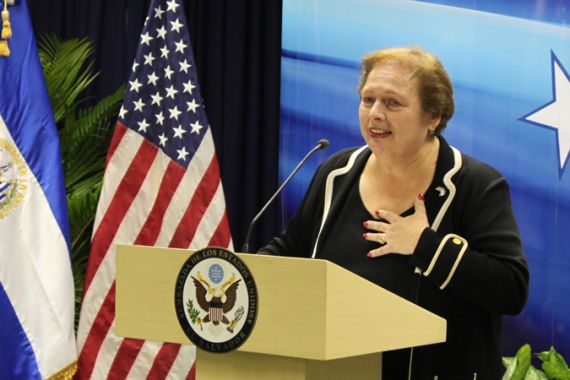Republicans derail US ambassador to El Salvador
Despite her commendable performance, Mari Carmen Aponte will not be returning to El Salvador as ambassador.

 |
| Republican Senator Marco Rubio says he voted against Aponte to showcase his discontent with current policies [EPA] |
Scranton, Pennsylvania – The United States Senate recently blocked President Barack Obama’s nominee for ambassador to El Salvador. Mari Carmen Aponte had been serving as ambassador to El Salvador since September 2010 and, by most measures, seems to have done a fine job representing US interests in the country.
However, given that Aponte was a 2010 recess appointment which allowed Obama to sidestep Senate concerns, the Senate would have needed to confirm her nomination in order for her to continue to serve as ambassador beyond the end of this year. Instead, 49 Senators, including one Democrat, voted to block Aponte’s nomination.
Several opinion pieces have taken to explaining that Aponte’s nomination was derailed by an op-ed published in El Salvador where she defended the rights of gays and lesbians. However, I would argue that her nomination would have failed even if she had not written the op-ed.
First, the op-ed. Aponte published a June 2011 op-ed in a Salvadoran newspaper, La Prensa Gráfica, in which she advocated “For the Elimination of Prejudices Wherever They Exist”.
Her op-ed was consistent with US foreign policy and with Salvadoran domestic policy; the US and El Salvador are among 80 countries that have signed a UN declaration calling for the elimination of violence against gays and lesbians. In her op-ed, Aponte also noted that Salvadoran President Mauricio Funes had signed a 2010 decree that prohibited government discrimination on the basis of sexual orientation. Therefore, Aponte’s statements did not contradict Salvadoran responsibilities under international treaties and domestic laws.
However, that wasn’t enough for Senate Republicans who claim that her statements were un-ambassadorial in a country with such a large Catholic population. Republican Senator Jim DeMint of South Carolina laid out the argument against Aponte in Human Events in November. He wrote:
Her provocative editorial stirred controversy and was rebuked throughout Latin America. A wide range of religious, community and family groups from across the region wrote a response to Ms Aponte in El Diario de Hoy that said, “Ms Aponte, in clear violation of the rules of diplomacy and international law, you intend to impose to Salvadorans, disregarding our profound Christian values, rooted in natural law, a new vision of foreign and bizarre values, completely alien to our moral fibre, intending to disguise this as ‘human rights'”.
While DeMint’s description of the regional disapproval of Aponte’s words certainly overstates the actual reaction, I wouldn’t be surprised if several members of the Senate voted against her nomination as a result. These Republicans deemed her statements pro-homosexual and anti-family.
However, in some ways, the op-ed was just the last straw in a failed nomination. Senate Republicans opposed Aponte as early as she was proposed for the post in December 2009. Years ago, a Cuban spy alleged that a 1980s live-in boyfriend of Aponte, Cuban-American Roberto Tamayo, was also a Cuban spy.
When the allegations first came to light, Aponte withdrew her nomination as President Clinton’s ambassador to the Dominican Republic. The Federal Bureau of Investigations (FBI) found no evidence of wrongdoing and Aponte later received two top secret clearances.
However, some senators still demanded more information surrounding her relationship with Tamayo. They also wanted her to respond to allegations that Cuban intelligence tried to recruit her. Some allegedly even wanted her to take a lie detector test; Senate Republicans must not have much confidence in the FBI.
As a result, President Obama was forced to make Aponte an August 2010 recess appointment. For the past two years Senate Republicans have complained that Aponte and the Obama administration failed to provide them with information about the romantic relationship. Therefore, there was no reason for them to change their minds about her nomination.
Given that Senate Republicans had already stated their intention of rejecting her nomination, which was why she was a recess appointment in the first place, it’s difficult to argue that her op-ed was a major cause; her nomination was in trouble, if not doomed, before she picked up a pen.
It is more likely that Senator DeMint’s criticism of Ambassador Aponte and her op-ed was more for domestic consumption here in the US rather than to gain any favours with the people of El Salvador.
Finally, Aponte’s nomination was derailed because the nomination process is one of the few ways in which Republican members of Congress can show their disapproval of the president’s policies towards Central and South America. Operation Fast and Furious, the Nicaraguan election, violence in the Northern Triangle and Mexico, Iran’s influence in Latin America, and the Castro brothers’ vitality all played a role.
Republican Senator Marco Rubio from Florida, for instance, claims that his vote against Aponte was not against her personally, but rather the expression of a strong disagreement with the president’s policies towards Nicaragua and Cuba. Rubio even said that he was willing to support her nomination had he been convinced that the president was going to take a more supportive stance towards democracy in the region, particularly in Nicaragua and Cuba.
While the Obama administration has sought to come up with a broadly accepted plan on how to respond to Ortega’s power grab and irregularities in the vote, Senate Republicans have demanded that the administration move towards suspending Nicaragua (and Venezuela for that matter) from the Organisation of American States.
The administration’s tepid approach towards Nicaraguan President Daniel Ortega already cost Jonathan Farrar an ambassador posting to Nicaragua. Farrar’s nomination failed because of policies that he oversaw during his tenure as chief of mission at the US Interests Section in Havana, Cuba, during the Bush administration.
While chief of mission, Farrar distanced the US from various dissident groups that he believed had little support on the island. He also removed a ticker used to criticise the Cuban government that had been the source of tension between US and Cuban officials.
For Senator Rubio, Farrar’s weakness in promoting democracy and his placation of the Castro brothers would send the wrong signal to the world and to Nicaragua. Farrar wasn’t the right man for Nicaragua, but Rubio and other Republicans have few problems with him serving in another capacity – as he’ll be serving as the US ambassador to Panama next year.
Like Farrar’s nomination to Nicaragua, Aponte was done in by Cuba.
I disagree with the Republican Senators’ position on Aponte’s nomination: Her op-ed was consistent with US foreign policy and with the policies of the Salvadoran government.
She has also done a commendable job working with the Salvadoran government, a government that is currently led by the former Marxist-Leninist Farabundo Marti National Liberation Front (FMLN), a one-time US enemy. But unlike Farrar, it doesn’t appear there is a current ambassadorial opening that will allow Aponte to escape her alleged Cuban ties.
Mike Allison is an associate professor in the political science department and a member of the Latin American and Women’s Studies Department at the University of Scranton in Pennsylvania. He blogs on Central American Politics here.
The views expressed in this article are the author’s own and do not necessarily reflect Al Jazeera’s editorial policy.
